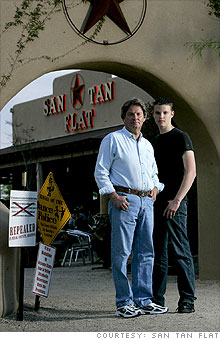Slaying the Boogie Monster
An Arizona saloon owner takes down antiquated dance ban.
 |
| San Tan Flat co-founders Dale and Spencer Bell. |
(FORTUNE Small Business) -- It sounds like the plot for a Footloose sequel: Small-town officials try to shut down a local saloon by wielding an antiquated ban on outdoor dance halls.
Last week, Dale Bell finally triumphed in his fight against a citation accusing the Arizona restaurateur of violating a 1962 Pinal County zoning ordinance by allowing patrons to swing their hips in the open-air courtyard at his Queen Creek, Ariz., venue, San Tan Flat Saloon & Grill.
Superior Court Judge William O'Neil overturned the government injunction, which threatened to fine Bell $700 for every day that the restaurant continued to create a nightclub-type atmosphere in its outdoor area. According to court documents, San Tan Flats would be considered in violation of its commercial zoning permit if its owners did not physically restrict patrons from dancing. (If Bell wanted to make use of his restaurant's small stage, the Board deemed mime and puppet shows acceptable. Just not loud music and dancing.)
"This case is certainly one of the most absurd and strange abuses of government power that we have come across," said Jennifer Perkins, a staff attorney from the Institute for Justice who represented Bell. "But it's a great example of what can happen when a local government really gets free reign over the individuals in their territory."
Dale Bell, 58, co-founded San Tan Flat in November 2005 with his son Spencer, now a 17-year-old senior at Arizona State University. The Western-themed family restaurant serves 3,000 to 5,000 customers a week and plays recorded and live music.
Three months after San Tan Flat's opening day, the county began receiving noise complaints. The sheriff's deputies tested the sound levels multiple times, but never found the saloon to be in violation of the county's noise ordinance.
"The noise is minor," said Paul Younger, the eatery's closest neighbor, who originally opposed its construction. Now, the 55-year-old beekeeper is a regular. "My neighbors across the road make noise once in a while, so it's not exclusive to this. It doesn't bother me that much."
But Bell claims that the county continued to come down hard on his business, sending officials to inspect everything from San Tan Flat's health-code compliance to its firewood stacks.
"They threw everything but the kitchen sink at us," Bell said.
The county's trump card: Its code-compliance staff dusted off a 40-year-old ordinance stating that certain amusement and recreational enterprises, including dance halls, must be housed "within a completely closed structure."
As Perkins puts it: "The county government took the position that when the patrons at San Tan Flat began to dance, they somehow morphed or transformed the entire venue, which is a restaurant, into a dance hall. And because he has an outdoor courtyard, that was then an outdoor dance hall."
Bell, whose $3-million business makes 99% of its revenue on food and beverage and the remaining sliver on t-shirts and billiard games, took the county to court, arguing that it was absurd to fine his restaurant as if it were a dance hall - he has never charged people to boogie.
Bell lost his first two rounds of legal fighting: The citation was upheld first by a county hearing officer, then by the local Board of Supervisions. But last Thursday, a state judge sided with Bell. The county does not plan to appeal.
Heather Murphy, director of communications for Pinal County, was hesitant to discuss the judge's ruling, but she admits that the county's infrastructure and regulations need to be updated.
"We feel intense pressure to preserve the rural and agricultural, as well as urbanize," she said. "We're working on our comprehensive plan right now to do that."
The sound of victory was music to Bell and his son's ears. Still, the fight with the county took its toll: Bell estimates that his clientele dropped by 30% after the dance ban citation was upheld a second time.
"There was a public perception that people couldn't dance and there was a perception among our customers that they themselves would be fined if they danced," Spencer Bell said. "We definitely did take a hit from it."
Dale Bell is frustrated that his son's first experience with entrepreneurship has been so wound up with red tape.
"I was trying to teach my kid how to become a small businessman and enjoy the American dream," he said. "What I really showed him was that the American dream has become the American nightmare. Small business is under attack, and it's about all that's left that's good about the American economy."
But youthful ambition is hard to grind down. "[Thursday] was definitely a very uplifting day," Spencer said cheerfully. "I don't think I'm going to let Pinal County slow me down or get me upset.' ![]()
D.C. mandates sick leave, exempts waiters and new hires
Does your accountant work for the IRS?
When One Little Guy Rolls Another: The Supreme Court decision on eminent domain is said to favor Goliath over David. But often there are Davids on both sides.
Will Congress slam small inventors?: A massive patent reform would be tough on entrepreneurs.
-
The Cheesecake Factory created smaller portions to survive the downturn. Play
-
A breeder of award-winning marijuana seeds is following the money and heading to the U.S. More
-
Most small businesses die within five years, but Amish businesses have a survival rate north of 90%. More
-
The 10 most popular franchise brands over the past decade -- and their failure rates. More
-
These firms are the last left in America making iconic products now in their twilight. More








